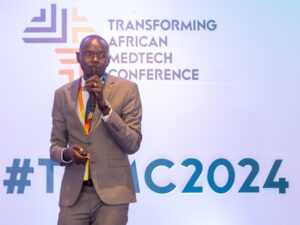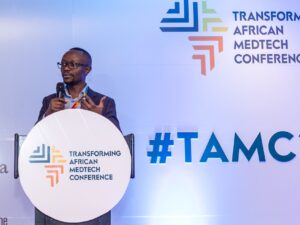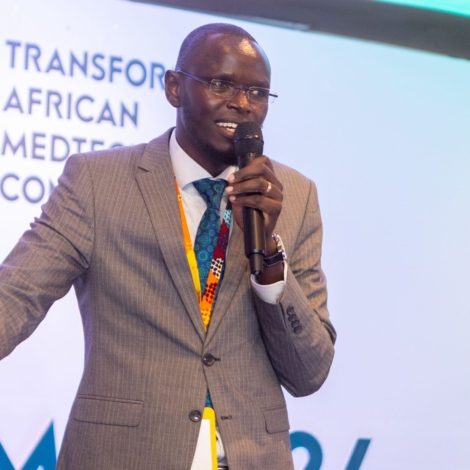
Dr. Stanley Aruyaru speaks at the Transforming African MedTech Conference in Nairobi, Kenya, in September 2024. Photo: Kimani Chege for E4C
[Nairobi, Kenya] Dr. Stanley Aruyaru is the chief medical officer of a church-owned medical facility on the outskirts of Nairobi, Kenya, found himself engulfed in a dilemma two months ago. The hospital’s only two x-ray image intensifier machines had broken down, and repairs required parts that were not available in Kenya. The PCEA Kikuyu hospital is well endowed compared to government hospitals in Kenya and other African countries, but it is still vulnerable to deficiencies in local and continental supply chains for medical devices. What followed was a series of frustrating endeavors to repair the machines with spare parts shipped from Germany, and two months to bring at least one machine back to life.
“These are situations we find ourselves in in Africa,” Dr Aruyaru said in a talk at the Transforming African Medtech Conference in Nairobi, Kenya. “We had to go through problem diagnosis, procurement, delay in shipping, and at one point a power surge malfunctioned one of the spare parts, making the process begin all over. This was at the expense of a long waiting line as patients sought for x-ray services,” he says.
Dr Aruyaru wishes for a local solution to such woes facing many healthcare facilities in Africa. “How can we have a local assembly that applies to local reality like power needs and supply and equipment fit for our purpose,” he says.
Africa imports about (USD) $4 billion in medical devices, representing about 90 percent of its needs, according to data availed at the conference. This expenditure is increasing as stringent regulatory and standardization regimes slow the work of local innovators and startups that cannot afford their high costs.
Despite the difficulties, Africa’s medtech industry holds immense promise. Today the continent accounts for just 1.2% of the global Medtech market, but the sector is poised for growth. Projections suggest the global market share could increase from $7.5 billion now to $9.8 billion by 2025, outpacing global growth rates.
The sector may have support in Africa’s innovation hubs. These hubs are gaining traction in cities referred to as “startup capitals” such as Lagos, Nairobi, Cairo, Kigali, and Cape Town. They attract funding and allow innovators to develop their products with the support of an ecosystem. Some of these hubs are based in universities, industrial parks, and private companies.
“If we build medtech ecosystems in developing cities like Kenya’s techno city Konza, the country, and Africa can attract global investment and transform healthcare into a major economic contributor” – Wilfred Njagi, Co-Founder of Villgro Africa
At the moment, most of Afria’s innovation hubs are dominated by fintech startups and general software developers. Medtech is slowly catching on, however, with centers including the Kigali-based HealthTech hub and Centre for Innovation and Entrepreneurship Education (IEEED) at Dedan Kimathi University of Technology in Kenya. These initiatives are works in progress. Players in the medtech industry see them as support for products that help both in the engineering and development of their sector.

Wilfred Njagi, Co-Founder and CEO of Villgro Africa. Photo: Kimani Chege / E4C
Wilfred Njagi, Co-Founder and CEO of Villgro Africa, notes that with the establishment of innovation hubs dedicated to medtech, medical practitioners like Dr. Aruyaru do not need to spend large sums to acquire spare parts for their medical equipment, and time is not lost in providing services to patients.
India’s healthcare sector may serve as a model. Mr. Njagi added that African countries spend huge amounts of money to seek medical treatment in India, a country that has managed to grow its medtech industry. India’s medical technology industry was estimated at $11 billion in 2022 and is expected to grow, with a projected market value of $50 billion by 2030. As a result, India earned $7.4 billion from medical tourism in 2022 and is expected to earn $43.5 billion by 2032.
“This is just one example of how we can focus on manufacturing medical devices locally rather than depending on imports” – Emmanuel Kamuhire, Founder of A-Lite Uganda
If Africa were to develop its medtech industry, Mr. Njagi says, it could foster an ecosystem of companies producing quality equipment, spare parts, and research and innovation. All of which would create major economic growth.
He also pointed to the broader economic potential of medtech hubs, noting that healthcare should not be seen solely as a social service but as a key sector in driving economic growth.
“If we build medtech ecosystems in developing cities like Kenya’s techno city Konza, the country, and Africa can attract global investment and transform healthcare into a major economic contributor. Africa should be encouraging medical tourism, just as it does with tourism,” he argues.
Dr. Mazyanga Lucy Liwewe Mazaba at the Africa Centres for Disease Control and Prevention shares similar views. She notes that her regional center is working with countries in Africa to encourage the development of medtech hubs that can by extension promote innovation.
Emmanuel Kamuhire, Founder and CEO of A-Lite Uganda, highlighted the potential of local innovation, sharing his experience developing a device that helps doctors locate veins for intravenous cannulation.
“This is just one example of how we can focus on manufacturing medical devices locally rather than depending on imports,” Kamuhire said. Such innovations demonstrate that African entrepreneurs are ready to meet the continent’s healthcare needs, provided they have the necessary support.
It is through such ventures that African medtech players believe the defragmented African market can promote growth, create jobs, and harness a promising medical engineering field in the continent.
Kimani Chege is a journalist based in Nairobi Kenya and a 2021 Engineering for Change Editorial Fellow. He specializes in science, technology and climate change. Twitter: @Kymcee LinkedIn: Kimani Chege.


Absolutely inspiring. Africa’s medtech industry holds massive untapped potential not just to improve healthcare, but to drive economic growth, create jobs, and spark innovation.
As a biomedical engineering student, I truly believe local solutions like Emmanuel Kamuhire’s device show we’re capable we just need the right support.
It’s time we see healthcare as both a need and an opportunity for Africa to lead.